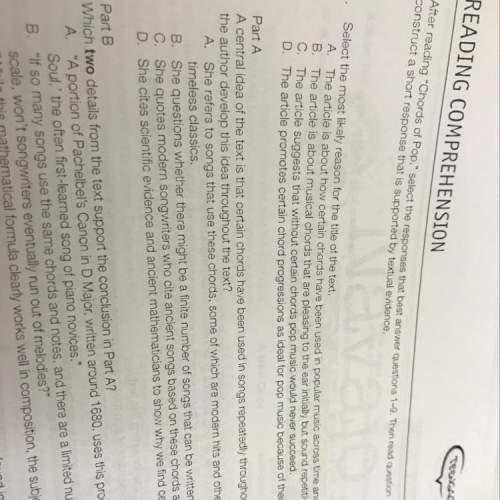
English, 31.03.2020 00:48 SkylarAaliyah
In 1994, New York Times music columnist Alex Ross wrote in a lighthearted article, "researchers Rauscher and Shaw have determined that listening to Mozart actually makes you smarter," and presented this as the final piece of evidence that Mozart has dethroned Beethoven as "the world's greatest composer." A 1997 Boston Globe article also mentioned some of the Rauscher and Shaw results. It described one study in which three- and four-year-olds who were given eight months of private piano lessons scored 34% higher on tests of spatio-temporal reasoning than control groups given computer lessons, singing lessons, and no training. The 1997 book by Don Campbell, The Mozart Effect: Tapping the Power of Music to Heal the Body, Strengthen the Mind, and Unlock the Creative Spirit, discusses the theory that listening to Mozart (especially the piano concertos) may temporarily increase one's IQ and produce many other beneficial effects on mental function. Campbell recommends playing specially selected classical music to infants, in the expectation that it will benefit their mental development. After The Mozart Effect, Campbell wrote a follow-up book, The Mozart Effect For Children, and created related products. Among these are collections of music that he states harness the Mozart effect to enhance "deep rest and rejuvenation", "intelligence and learning", and "creativity and imagination". Campbell defines the term as "an inclusive term signifying the transformational powers of music in health, education, and well-being. It represents the general use of music to reduce stress, depression, or anxiety; induce relaxation or sleep; activate the body; and improve memory or awareness. Innovative and experimental uses of music and sound can improve listening disorders, dyslexia, attention deficit disorder, autism, and other mental and physical disorders and diseases." These theories are controversial. The relationship of sound and music (both played and listened to) for cognitive function and various physiological metrics has been explored in studies with no definitive results. Choose all answers that identify types of evidence cited in the passage.

Answers: 1


Another question on English

English, 21.06.2019 19:20
Reflect on the strange case of dr. jekyll and mr. hyde. in five to six sentences, explain how dr. jekyll develops
Answers: 3

English, 21.06.2019 19:30
The book the sweet-hereafter; in section four, which of the following is the extended metaphor for nichole's mental state. a) the room her father built her from the sun-room b) the wheel chair she sits in c)the computer from mr. stephens d) the teddy bear from her childhood
Answers: 1


You know the right answer?
In 1994, New York Times music columnist Alex Ross wrote in a lighthearted article, "researchers Raus...
Questions

Social Studies, 10.10.2019 19:30



English, 10.10.2019 19:30


Mathematics, 10.10.2019 19:30


History, 10.10.2019 19:30



Biology, 10.10.2019 19:30





English, 10.10.2019 19:30



Social Studies, 10.10.2019 19:30




